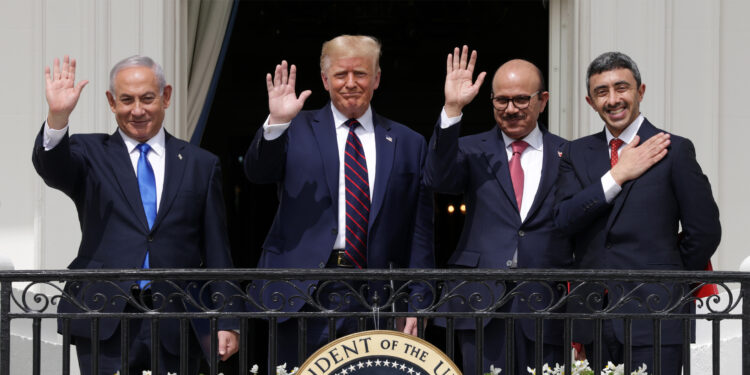April 17, 2024, 7:08 pm
Author – Ken Klippenstein

Ahead of the United Nations Security Council action to consider the Palestinian Authority’s application to become a full member of the international body, the United States is lobbying nations to reject such membership, hoping to avoid an overt “veto” by Washington. The lobbying effort, revealed in copies of unclassified State Department cables obtained by The Intercept, is at odds with the Biden administration’s pledge to fully support a two-state solution.
In 2012, the U.N. General Assembly passed a resolution granting Palestine the status of a non-member observer state.
The diplomatic cables detail pressure being applied to members of the Security Council, including Malta, the rotating president of the council this month. Ecuador in particular is being asked to lobby Malta and other nations, including France, to oppose U.N. recognition. The State Department’s justification is that normalizing relations between Israel and Arab states is the fastest and most effective way to achieve an enduring and productive statehood.
While clarifying that President Joe Biden has worked vigorously to support “Palestinian aspirations for statehood” within the context “of a comprehensive peace that would resolve the Israeli-Palestinian conflict,” a diplomatic cable dated April 12 details U.S. talking points against a U.N. vote for Palestinian statehood. The cable says that Security Council members must be persuaded to reject any proposal for Palestinian statehood — and thereby its recognition as a sovereign nation — before the council’s open debate on the Middle East, scheduled for April 18.
“It remains the U.S. view that the most expeditious path toward a political horizon for the Palestinian people is in the context of a normalization agreement between Israel and its neighbors,” the cable reads. “We believe this approach can tangibly advance Palestinian goals in a meaningful and enduring way.”
“We therefore urge you not to support any potential Security Council resolution recommending the admission of ‘Palestine’ as a U.N. member state, should such a resolution be presented to the Security Council for a decision in the coming days and weeks.”
Experts say that without a unanimous Security Council vote, any vote from the U.N. General Assembly is largely symbolic.
“Like it or not, a General Assembly vote on this issue is of political rather than legal weight,” Richard Gowan, the International Crisis Group’s U.N. director, told The Intercept. “The Assembly can only accept a new state ‘on the recommendation’ of the Security Council.”
The diplomatic cable includes a rationale for the administration’s opposition to the vote, citing the risk of inflaming tensions, political backlash, and potentially leading to the U.S. Congress cutting U.N. funding.
“Premature actions at the UNSC, even with the best intentions, will achieve neither statehood nor self-determination for the Palestinian people. Such initiatives will instead endanger normalization efforts and drive the parties further apart, heighten the risk of violence on the ground that could claim innocent lives on both sides, and risk support for the new, reform government announced by President Abbas,” the cable says.
Asked about the cable and whether its opposition to U.N. recognition of Palestinian statehood contradicts the Biden administration’s position in support of a two-state solution, the State Department did not respond at the time of publication.
“The U.S. position is that the Palestinian state should be based on bilateral agreements between the Israelis and Palestinians,” Gowan said. “It does not believe that the UN can create the state by fiat.”
A second cable dated April 13 sent from the U.S. Embassy in Quito, Ecuador, relays Ecuadorian Foreign Minister Gabriela Sommerfeld’s agreement with the United States that Palestine should not be recognized for statehood. In cooperation with the United States, according to the cable, Sommerfeld instructed Ecuador’s permanent representative to the United Nations José De La Gasca to lobby Japan, Korea, and Malta (all rotating members of the Security Council) to reject the proposal. Lobbying of permanent member France is also mentioned.
Sommerfeld agreed, according to the cable, that “It was important any proposed resolution fail to achieve the necessary votes without a U.S. veto.” The cable says, “Ecuador would not want to appear isolated (alone with the United States) in its rejection of a ‘Palestine’ resolution (particularly at a time when the most UN member states are criticizing Ecuador over its April 5 incursion into Mexico’s embassy in Quito).” Ecuador finds itself in an escalating conflict with Mexico over its decision to arrest the former Ecuadorian vice president inside the Mexican Embassy.
Asked about the second cable, the State Department and the Ecuadorian Embassy in Washington did not respond to requests for comment.
With its yearlong seat on the powerful 15-member Security Council, Ecuador holds outsized influence to vote against the Palestinian proposal for recognition.
“This really shows the extent to which the [Ecuadorian President Daniel] Noboa administration is beholden to the United States,” Guillaume Long, senior fellow at the D.C.-based Center for Economic and Policy Research and former foreign minister of Ecuador, told The Intercept when shown the cable. “On top of this, it is quite shocking to see the United States, which condemned Ecuador’s April 5 storming of the Mexican embassy and its violation of international law … making the most of Ecuador’s isolation in the hemisphere to get it to do its bidding. Ecuador is just buying its way out of its crimes by committing more crimes. Truly shocking,” said Long, referring to Ecuador’s rejection of Palestinian membership in the U.N.
Since 2011, the U.N. Security Council has rejected the Palestinian Authority’s request for full member status. On April 2, the Palestinian Observer Mission to the U.N. requested that the council once again take up consideration of its membership application. According to the first State Department cable, U.N. meetings since the beginning of April suggest that Algeria, China, Guyana, Mozambique, Russia, Slovenia, Sierra Leone, and Malta support granting Palestine full membership to the U.N. It also says that France, Japan, and Korea are undecided, while the United Kingdom will likely abstain from a vote.
“It is important that all Security Council members hear at this stage of the process that a number of members have questions that require further study about the Palestinian Authority’s formal request for UN membership through the Council, and that if a vote is forced on the issue, you will join the United States and not support approval of the application,” the cable reads.
The post Leaked Cables Show White House Opposes Palestinian Statehood appeared first on The Intercept.
Full Article
Author: Ken Klippenstein











